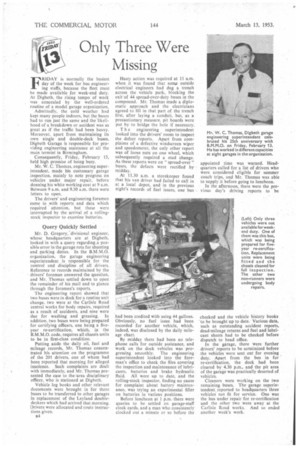Only Three Were Missing
Page 38

If you've noticed an error in this article please click here to report it so we can fix it.
FRIDAY is normally the busiest day of the week for bus engineer
ing staffs, because the fleet must be made available for week-end duty. At Digbeth, the rising tempo of work was concealed by the well-ordered routine of a model garage organization.
Admittedly, the cold weather had kept many people indoors, but the buses had to run just the same and the likelihood of a breakdown or accident was as great as if the traffic had been heavy. Moreover, apart from maintaining its own single and double-deck buses, Digbeth Garage is responsible for providing engineering assistance at all the main termini in Birmingham.
Consequently, Friday, February 13, held high promise of being busy.
Mr. W. C. Thomas, engineering superintendent, made his customary garage inspection, mainly to note progress on vehicles under major repair, before donning his white working coat at 9 a.m. Between 9 a.m. and 9.30 a.m, there were letters to open.
The drivers' and engineering foremen came in with reports and data which required attention, but these were interrupted by the arrival of a rollingstock inspector to examine batteries.
Query Quickly Settled
Mr. D. Gregory, divisional engineer, whose headquarters are at Digbeth, looked in with a query regarding,a possible error in the garage rota for shunting and parking duties. In the B.M.M.O. organization, the garage engineering superintendent is responsible for the control and discipline of all drivers. Reference to records maintained by the drivers' foreman answered the question, and Mr. Thomas settled down to open the remainder of his mail and to glance through the foremen's reports.
The engineering report showed that two buses were in dock for a routine unit change, two were at the Carlisle Road central works for body repairs, required as a result of accidents, and nine were due for washing and greasing. In addition, two buses were being prepared for certifying officers, one being a fiveyear re-certification, which, in the B.M.M.O. code, requires all chassis units to be in first-class condition.
Putting aside the daily oil, fuel and mileage records, Mr. Thomas concentrated his attention on the programme of the 201 drivers, one of whom had been reported that morning for alleged insolence. Such complaints are dealt with immediately, and Mr. Thomas presented the case to the area disciplinary officer, who is stationed at Digbeth.
Vehicle log books and other relevant documents were brought in for three buses to he transferred to other garages in replacement of the Leyland doubledeckers which had arrived that morning. Drivers were allocated and route instructions given.
B4
Hasty action was required at 11 a.m. when it was found that some outside electrical engineers had dug a trench across the vehicle park, blocking the exit of 44 spread-over-duty buses in the compound. Mr. Thomas made a diplomatic approach and the electricians agreed to fill in that part of the trench first, after laying a conduit, but, as a precautionary measure, pit boards were put by to bridge the hole if necessary.
T h e engineering superintendent looked into the drivers' room to inspect the defect reports. Apart from complaints of a defective windscreen wiper and speedometer, the only other report was of loose nuts on one wheel, which subsequently required a stud change. As these reports were on " spread-over " buses, the defects were rectified by midday.
At 11.30 a.m. a storekeeper found that his van driver had failed to call in at a local depot, and in the previous night's records of fuel issues, one bus
had been credited with using 44 gallons. Obviously, no fuel issue had been recorded for another vehicle, which, indeed, was disclosed by the daily mileage chart.
By midday there had been no telephone calls for outside assistance, and work on the dock vehicles was progressing smoothly. The engineering superintendent looked into the foreman's office to check the files covering the inspection and maintenance of lubricants, batteries and brake hydraulic fluid. All were up to date, and the rolling-stock inspector, finding no cause for complaint about battery maintenance, was trying an experimental filler on batteries in various positions.
Before luncheon at 1 p.m. there were queries to be settled on garage-staff clock cards, and a man who consistently clocked out a minute or so before the appointed time was warned. Headquarters called for a list of drivers who were considered eligible for summer coach trips, and Mr. Thomas was able to supply.it before going to luncheon.
In the afternoon, there were the previous day's driving reports to be checked and the vehicle history books to be brought up to date. Various data, such as outstanding accident reports, dead-mileage returns and fuel and lubricant sheets had to be checked before dispatch to head office. In the garage, there were further drivers' reports to be scrutinized before the vehicles were sent out for evening duty. Apart from the bus in for re-certification, the dock had been cleared by 4.30 p.m., and the pit area of the garage was practically deserted of vehicles.
Cleaners were working on the two remaining buses. The garage superintendent reported to headquarters three vehicles not fit for service. One was the bus under repair for re-certification and the other two were away at the Carlisle Road works. And so ended another week's work.




















































































